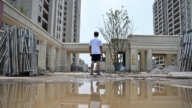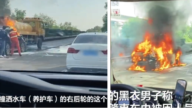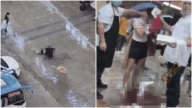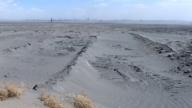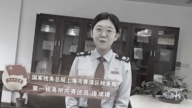【新唐人2011年7月23日讯】在7月20号北京召开的“国际经济交流中心经济每月谈”会议上,中共当局试图在“抑通胀”和“稳增长”之间寻找平衡点。经济学家程晓农博士指出,中共政权错误的经济政策导致通货膨胀无法遏制,经济恶化不可避免。
在北京的会上,中共官员声称有能力在年内把CPI涨幅控制在5%左右,同时开出了能使中国经济持续增长的所谓“药方”。
中共当局年初设定的通胀目标为4%。但自3月以来,CPI同比涨幅已经连续四个月位于5%上方,6月更是一举破六触及6.4%的三年高点。而央行为了控制通胀,自去年10月初以来已经五次加息,八次上调存款准备金率。
总理温家宝最近也说,要坚持实施稳健的货币政策,既要把物价涨幅降下来,又不使经济增速出现大的波动。
不过,经济学家程晓农认为,中国在所谓的经济增长和通货膨胀之间寻找平衡点,是非常困难的,至少从目前来看,他们的做法没有成功。
程晓农“从中国(共)政府和中央银行的金融政策来看,现在中央银行表面上似乎是在收紧银根,同时也试图遏制房地产泡沫的进一步膨胀,但是实际上从货币投放量来看,并没有减少,相反还在以很快的速度增加。从这个角度来看,目前可以说两个目标都做不到。”
程晓农把中共当局调控的做法比喻为“狐狸过冰”。
程晓农:“用个形象的说法它在整个调控的路上是走走停停,有点像狐狸过冰。狐狸过冰的特点是狐狸在冰上走,走一步,狐疑的四面看,到处听,看冰会不会裂,会不会掉下去。现在的宏观调控也是这个路、模式。动一下就不动了,这样拖拖拉拉磨磨蹭蹭的结果就是,通货膨胀继续在涨,6月份又有新的很高增长率,同时房地产泡沫继续维持在那里。”
至于导致中国目前通货膨胀压力过大的原因,程晓农认为是中国的错误经济政策造成的。2008年中共当局投放20多万亿的货币,把经济硬给拉起来,造成基础设施建设和房地产的大泡﹔另外,加上世界各国的各种热钱,也就是各种投资的蜂拥而入,这两种因素结合在一起,造成中国通货膨胀压力大,房地产泡沫始终下不去。
程晓农:“到了现在为止中国已经到了一种两难的状态了,所谓两难就是他如果不遏制通货膨胀,中低收入阶层很快面临吃不消的状态﹔另一方面,由于房地产现在的遏制,地方政府的卖地收入大幅度下降。这样的话,地方政府将面临越来越严峻的困难,同时地方财政平台10来万亿的债务,将成为很危险的定时炸弹。”
鉴于目前的情况,程晓农博士认为,中共当局采取的手段是可能会把手伸到股市上去,这样股市会进一步被打下去,一蹶不振。
程晓农:“中国政府现在想做的事情是想把地方政府的债务转嫁给股市上的股民,同时中国的各家银行,因为银根收紧,资金不足,所以也在股市上圈钱,今年各大银行纷纷要在股市上发行金股或者发行地方债券。”
对于中国未来经济状况如何走势,程晓农表示,情况恶化不可避免。他认为,受通膨压力无路可走的中央缩紧银根,这会使“熬日子”的房地产公司撑不住,房地产贷款当中的坏账也会进一步增加,所以各种危机在未来很快显现。
不过,中国未来的经济甚至还有“雪上加霜”的可能。
程晓农博士认为,未来持续恶化的中国经济也会导致外商撤资,因此导致中国经济进一步恶化。
新唐人记者刘惠、宋风、王明宇采访报导。
China’s Inflation Worsens Economy
On International Economic Exchange Center (IEEC)
monthly forum held in Beijing on July 20,
the Chinese Communist Party (CCP) walked a fine line
between curbing inflation and economic development.
Economist Cheng Xiaonong, said that
the CCP’s misleading economic policy brought China’s
unbridled inflation and further worsened the economy.
On the IEEC forum, the CCP claimed to be capable of
containing the Consumer Price Index (CPI) growth within 5%.
Also, they proposed a solution
for the continuous growth of China’s economy.
The CCP set an inflation target of 4% earlier this year.
However, since March, the CPI increase exceeded 5%
year-on-year, every month for four consecutive months.
In June, the inflation peaked to 6.4%,
the highest in three years.
The Central Bank of China (CBC) has increased interest
rates five times since October 2010 and increased
its reserve rate eight times, just to curb the inflation.
CCP’s Premier Wen Jiabao recently pledged to continue
the current stabilizing monetary policy,
in order to slow down price increases,
while keeping the economic growth smooth.
Economist Cheng Xiaonong suggests that trying to strike
a balance between economic growth and inflation control
will be hard to achieve.
At least for now, the measures they took didn’t work.
Chend: Judging from the CCP’s and it’s financial policy,
it appears that the CBC is reducing the money supply,
in an attempt to curb the real estate bubble from enlarging.
However, the money supply is not reduced, instead,
it is increasing at a very fast pace.
Thus, the CCP and the CBC failed to strike a balance
between economic growth and the inflation.
Cheng Xiaonong likened the CCP’s controlling measures
to a “fox walking on ice.”
Cheng: The CCP’s regulatory policy operates in a
stop-and-go manner, which resembles a fox walking on ice.
The fox walking on ice is cautiously looking around,
listening and worrying if the ice will break under its feet.
It is much like the current macroeconomic regulations
that are in place.
As a result, inflation is on the rise with a notable peak
in June, while the real estate bubble keeps getting bigger.
Cheng believes that China’s out-of-control inflation
stems from the CCP’s misleading economic policy.
The $3 trillion worth of government bonds issued
in 2008 did give a lift to China’s economy,
but it also created the bubbles in
construction of infrastructure and real estate.
Instead lots of foreign investments poured into China, raising
the inflation and further exasperating the real estate bubble.
Cheng: China is now in a dilemma: on one hand,
if the country’s inflation is not controlled the lower
and middle classes will not be able to survive for long;
on the other hand, regional government revenues have
sharply decreased due to the curbed real estate market.
The $1.5 trillion in regional government debt will act like
a time bomb, as the economy worsens.
Cheng believes that the CCP may take regulatory measures
in China’s stock market, which will be devastated.
Cheng: “The CCP intends to transfer the debts from
regional governments to stock market investors.
Meanwhile, due to the reduced money supply, banks
in China will start to raise money from the stock market.
Large banks will then issue so called “gold shares”
and regional bonds.
Cheng says China’s economy will likely worsen
in the near future.
He said that the CBC’s reduced money supply
would make it unbearable for real estate companies.
Bad mortgages will increase.
So, all kinds of crises will manifest soon in the future.
In addition, there are many other potential dangers
underlying China’s economy.
Cheng suggests that due to the worsening economy,
overseas investors might withdraw from China,
thus further worsening the economy.
NTD reporters Liu Hui, Song Feng and Wang Mingyu




